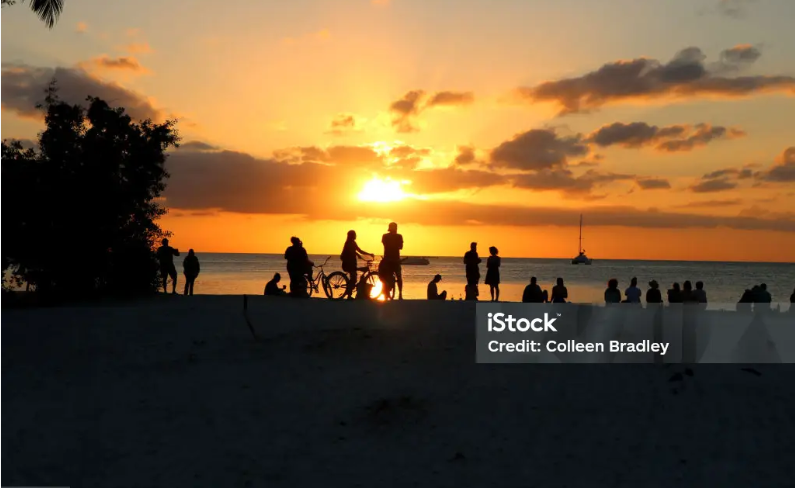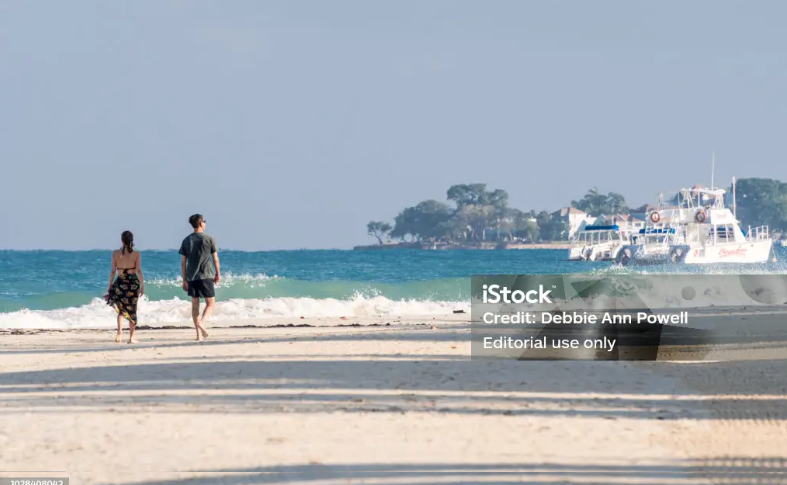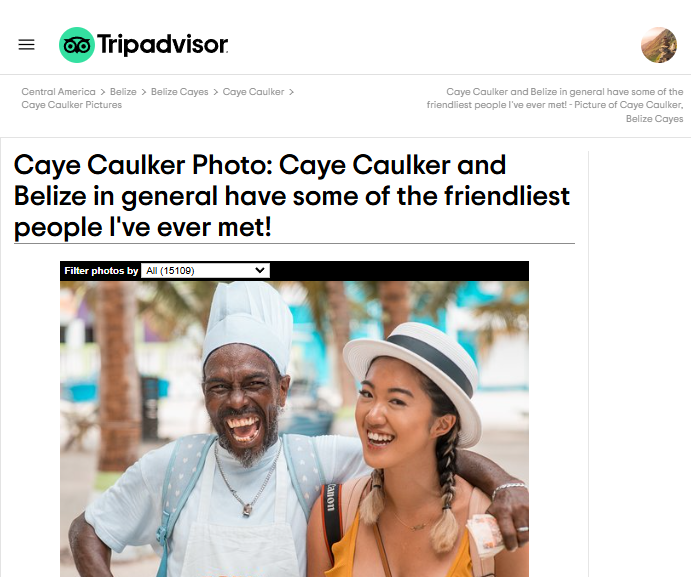Menu
Close
Through experiencing both beaches firsthand, one witnesses how public access policies shape not just the physical landscape, but how the very essence of these Caribbean communities and their relationship with their natural heritage is shaped by their respective laws.
At The Split in Caye Caulker, the air buzzes with the rich energy of shared space.
Children from the island community leap from rickety wooden platforms with the same freedom as sunburned tourists, their shared laughter creating a symphony that belongs to everyone and no one.
The sight of local entrepreneurs moving freely along the beach, offering services and crafts to tourists, creates an organic marketplace where cultural exchange happens naturally, without the awkward dance of exclusion and permission.
As the sun goes down and conch fishermen dock their boats alongside sun bathing tourists, both tourists and locals will cluster, both equally worthy and eager to indulge in the succulent catch, prepared with fresh-squeezed lime, the ritual of sharing food dissolving any artificial boundaries between visitor and resident.
Here, no one owns the sunset.

Meanwhile, along Negril’s seven-mile beach, an invisible wall runs parallel to the shoreline, as impenetrable as any physical barrier. Local residents hurry past vast stretches of their own coastline, their eyes trained forward, as if the sand itself might accuse them of trespassing.
The absurdity reaches its peak when Jamaican families must become paying guests at foreign-owned hotels to access beaches their grandparents once freely walked, their natural heritage now hidden behind security checkpoints and all-inclusive wristbands.
This transformation of public space into private commodity reflects a deeper colonial wound – the persistent belief that Caribbean beauty must be packaged, controlled, and sold rather than shared and celebrated in its full essence.

In Caye Caulker, Belize’s shoreline access law ensures that the first 66 feet from the high-water mark remains public property, a buffer zone of egalitarianism where patrimony trumps commerce.
Local fishermen pull their boats directly onto these protected shores, maintaining traditional livelihoods that predate tourism by generations. Their right to work these waters remains unquestioned, their presence an essential thread in the community’s fabric.
Local entrepreneurs of all ages, peacefully set up impromptu beach bars, art galleries and food stands along The Split, and along the 5 miles or of beach that leads to it, their businesses adding to, rather than detracting from the tourist experience. Here, local commerce and presence is seen as enrichment rather than intrusion.

Jamaica’s beach access is governed by a colonial-era law, the Beach Control Act of 1956. Under this act, Jamaica’s Beach Control Authority issues licenses, including exclusive licenses granting private rights to use the foreshore.
This system results in increasing privatization of the coastline, by mega resorts and hotels, and shrinking access for Jamaicans. Access is generally restricted to beaches declared ‘public recreational beaches’, often requiring a fee. The tangible result is limited access to beaches for recreation and stress relief for local Jamaicans, particularly those who cannot afford to pay for beach access
There is no general right for the public to bathe, fish, or even walk along the beach in Jamaica.
The contrast with Jamaica’s Beach Control Act of 1956 could not be starker. This colonial-era legislation, still haunting modern Jamaica, treats beach access as a privilege to be granted rather than a right to be protected.
Walking along Negril’s beach, one witnesses the painful choreography of exclusion – security guards silently but unequivocally turning away local residents with a glance, the invisible lines between “resort beach” and “public access” carved deep into the community’s consciousness.
The sight of local vendors attempting to sell their crafts through resort fences, their movements furtive and apologetic, transforms commerce into an act of shame rather than resilience.
In Caye Caulker, locals’ music mingles freely with the sound of waves, creating a soundtrack that belongs to everyone. Impromptu dance parties erupt, where tourist and local movements blend into a single celebration of place and moment.
But in Negril, resort walls increasingly separate the rhythm of local life from the curated experience of tourism. The beach, a naturally welcoming amphitheater for cultural exchange, becomes instead a stage where locals appear only as scheduled entertainment.
The offense of Jamaica’s shrinking beach access lies not just in the physical restriction of space, but in the message it sends: that somehow, the presence of Jamaicans diminishes rather than enhances the experience of Jamaica itself.
This commodification of coast reaches beyond mere economics into the realm of cultural dignity. Each newly restricted beach access point represents another small tear in the fabric of Jamaican society, another step away from the natural relationship between people and their environment.
The success of Caye Caulker’s model proves that equitable access enhances rather than diminishes tourism value. Here, authentic cultural exchange creates the very atmosphere visitors seek, while preserving local dignity and traditional ways of life.
In their petition launched in 2022, they argue that the law is discriminatory and call on the Jamaican government to ‘immediately repeal and replace the colonial-era law, and grant the Jamaican people unfettered access to the beaches and use of the sea and rivers.
They flag with particular concern, developments near Bob Marley in Bull Bay, St. Thomas, which threaten Jamaican freedom of access to what was once the ‘favourite spiritual retreat of the late Bob Marley’.
They highlight the stark contrast with Jamaica’s law and the rest of the Caribbean where the right to access to the sea a central aspect of our Caribbean heritage is enshrined by law.
Prominent figures like Ziggy Marley and Cedella Marley have joined the call for unconditional beach access for all Jamaicans, emphasizing the importance of natural resources for the well-being of local communities and future generations.
While the Prime Minister has acknowledged the importance of beach access for all Jamaicans, no tangible steps toward reform are being taken or explored.
If you too would like to join the call, click to sign JABBEM’s petion on Change.org
JABBEM’s calls for change and the ongoing disregard to the right to enjoyment of Jamaican people of their own coastline, resonates strongly with the principles expressed in the Stronger Caribbean Together Manifesto, which explicitly advocates for policies that “place water and land rights at the center of all levels of public policies, ensuring that these resources are protected and accessible to all” and recognizes access to the sea and marine resources as “vital resources for community dignity”.
Developed in July 2024 by network members from across the Caribbean, the Manifesto is the result of a collective process of sharing experiences, identifying common struggles, and the desire to platform just solutions.

Showcasing stories of Caribbean organizations at the foreground of the struggle against disaster capitalism in the Caribbean. Our network of participants in the Greater Caribbean region connect, learn, share their hands on responses to the impacts of the twin threats of the climate crisis and disaster capitalism in our region.
WAVE (Progressive Reform Movement)
Global Challenges Research Fund
Open Society Foundations
All Rights Reserved – strongercaribbeantogether.org 2022
All Rights Reserved – strongercaribbeantogether.org 2022
In the tumultuous aftermath of disasters, it is easy to feel isolated and alone, but you are not.
We, a network of Caribbean-wide community organizers who stand in solidarity with those affected the twin threats of the climate crises and disaster capitalism, a phenomenon that exacerbates the suffering of vulnerable communities.
We want you to know that your stories matter. We are here to listen, to support, and to amplify your voices.
We believe that together, we can challenge the forces of disaster capitalism and advocate for more sustainable, inclusive and equitable decision-making.
Join us in solidarity. Share your experiences and let’s build strong communities that thrive together.
As the wider world braces for the climate change, Caribbean communities are already struggling with its effects. Small local communities, small scale farmers and coastal communities are disproportionately affected. Political decisions, power dynamics and laws often compound the catastrophes and silence bottom up solutions.
There are ways in which you can help.